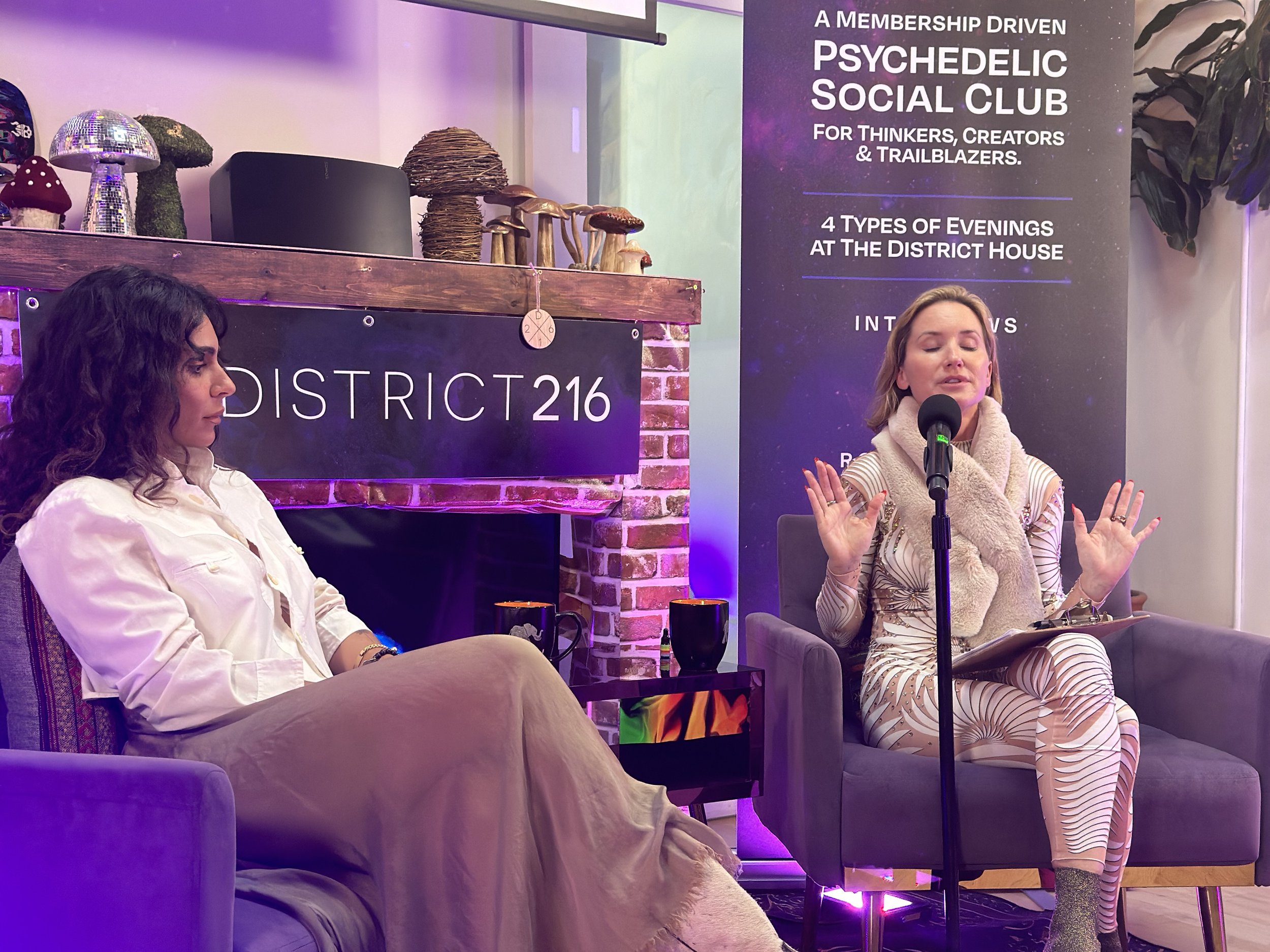Exploring the Intersection of Healing and Joy: A Talk on MDMA with Stephanie Karzon and Jane Garnett
At District216, we recently hosted a captivating discussion featuring two esteemed experts, Stephanie Karzon (MS CLIN PHARM) and Jane Garnett (LMFT). The event, titled “MDMA: Bridging the Gap Between Healing and Joy,” delved into the profound potential of MDMA in therapeutic settings, while also highlighting the essential role of joy, connection, and community in the healing process.
Stephanie Karzon brings an expansive career as a clinical pharmacologist and researcher, seamlessly blending clinical excellence with strategic insight and entrepreneurial spirit. Her work spans from the Neurology Centre of Toronto to advising the Microdosing Collective. Stephanie is at the forefront of exploring psychedelic and plant medicine's intersection with neurology, women’s health, and rehabilitative therapies. Through her consultancy, Beyond the Bench, she provides comprehensive guidance and expert advice to clinics and natural product companies, conducts research, and supports educational initiatives. Stephanie’s ventures, including Public Secret, The Last6, and Mt Mushmore, reflect her dedication to community building and philanthropy.
Jane Garnett, an Oxford-educated Marriage and Family Therapist, EMDR practitioner, and host of the podcast “Sex, Psychics & Psychedelics,” shared her extensive experience in both clinical practice and media. Jane's work in film production and advisory roles in groundbreaking series like “How to Change Your Mind” complements her therapeutic expertise, offering a multifaceted view on the benefits and challenges of psychedelics in mental health treatment.
The discussion emphasized that the power of joy, connection, and community forms the foundation of healing experiences. Whether through MDMA, heart-opening plants, or other activities fostering connection, these elements are crucial for both therapeutic and recreational settings. Stephanie and Jane explored how integrating these experiences can lead to profound personal growth and healing.
Stephanie provided an in-depth analysis of the pharmacological mechanisms of MDMA and its effects on the brain, emphasizing its role in reducing fear and defensiveness while enhancing empathy and trust. This unique combination can help patients process traumatic memories more effectively during therapy sessions. She highlighted ongoing research and shared promising results from recent studies that indicate MDMA's potential to revolutionize PTSD treatment.
Jane discussed the clinical application of MDMA-assisted therapy, drawing from her experience with EMDR and other therapeutic modalities. She stressed the importance of integrating MDMA with psychotherapy to maximize its benefits. Jane also addressed the stigma surrounding psychedelic therapies and the need for comprehensive education to encourage acceptance of these innovative treatments.
Stephanie and Jane underscored the importance of bridging the gap between medicine and culture. They discussed real-life applications of MDMA and other heart-opening plants, emphasizing that those seeking these experiences outside the medical model can still have safe and profound experiences. Whether used in therapy or recreationally, individuals have the opportunity and responsibility to integrate these experiences meaningfully into their lives.
Audience Q&A: The FDA Recommendation and Its Implications
The discussion took a critical turn during the audience Q&A session when the recent FDA advisory panel's recommendation against the use of MDMA for PTSD treatment was brought up. The panel's 9-2 vote against Lykos Therapeutics’ MDMA-variant midomafetamine, combined with psychological intervention, stirred a lively debate among attendees and speakers.
Concerns Raised by the FDA Advisory Panel: The FDA panel's concerns centered around potential abuse, insufficient safeguards, and doubts about the efficacy of the follow-up therapy. Issues with double-blinding in trials and allegations of misconduct and bias were also significant points of contention. The panel’s recommendation, while not binding, typically influences the FDA's final decision, expected by August 11.
Both Stephanie and Jane acknowledged the FDA panel's concerns but expressed optimism about MDMA’s future in therapeutic settings. Stephanie emphasized the importance of rigorous, unbiased research and the need to address the highlighted issues. She pointed out that while challenges exist, the potential benefits of MDMA-assisted therapy for PTSD cannot be ignored.
Jane stressed the importance of continuing to explore diverse therapeutic approaches, particularly given the limitations of current treatments. She argued for a balanced perspective that considers both the promising results from initial trials and the need for robust safety protocols.
A Special Thank You
We would like to extend a special thank you to KA! Empathogenics, who provided the audience with free samples of their Kanna supplements. These supplements activate full-spectrum aliveness and are a great addition to any wellness routine. Attendees can use the discount code StephanieK for purchases.
The evening at District216 underscored the profound impact of joy, connection, and community in the healing process. As we await the FDA's final decision, it is crucial to remain informed, engaged, and hopeful about the future of psychedelic therapies. Whether through MDMA-assisted therapy or other heart-opening activities, the power of integrating these experiences can lead to significant personal growth and healing.
For more information about our speakers, visit Stephanie Karzon's Beyond the Bench and Jane Garnett's work.
Stephanie karzon Abrams, District216 Chief Dreamer Jacob Tell, Jane Garnett
Stay tuned for more events and discussions at District216, where we continue to explore groundbreaking topics at the intersection of science, health, and culture.









